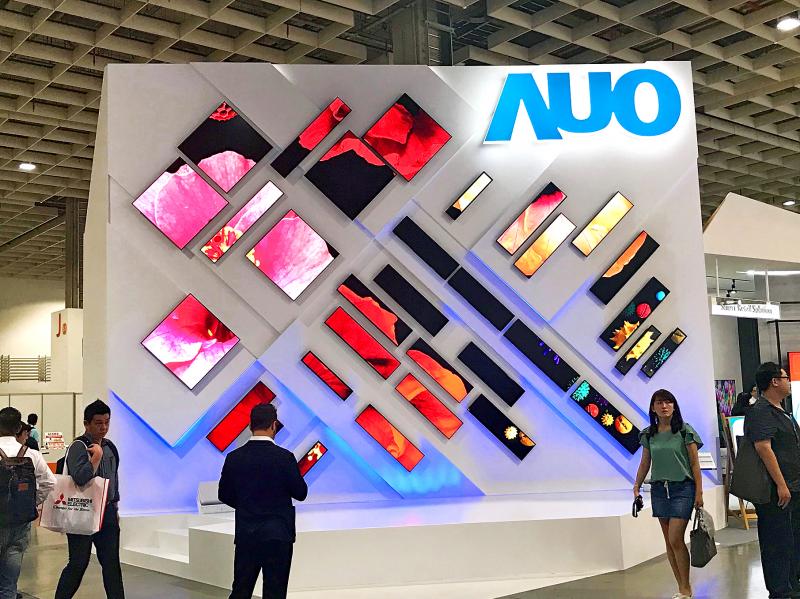LCD panel maker AU Optronics Corp (AUO, 友達光電) yesterday unveiled a plan to demerge its higher-margin public information and general purpose displays businesses, marking its first spin-off.
The plan is part of AUO’s structural adjustments to weather the industry’s boom-and-bust cycles and intensive competition. AUO posted a fifth straight loss for last quarter amid sagging demand and overcapacity.
AUO’s board of directors on Wednesday approved a proposal to spin off the two business groups with total assets valued at NT$386.55 million (US$12.91 million) into a new entity called Da Qing Corp (達擎), which would be a wholly owned subsidiary of AUO until the new company’s paid-in capital grows to NT$2 billion.

Photo: Chen Mei-ying, Taipei Times
Da Qing would focus on sales, research and development, and customer service of general purpose and public information displays, AUO said in a statement.
The display products are developed for a wide range of devices ranging from automated teller machines, self-service kiosks, in-flight entertainment and navigation systems, to smart factory industrial PCs and high-precision medical equipment, it said.
AUO said that the public information display products include displays for smart retail, transportation and education, as well as specialized industrial-grade displays for harsh environments, such as outdoors.
Products developed by Da Qing would deliver higher profit margins than commodity-type panels and have longer life cycles, AUO said.
Shareholders are to vote on the demerger at an annual meeting on June 16, and the spin-off is tentatively scheduled for Jan. 1.
AUO said it had earlier hoped to enhance product value through specification diversification and technology upgrades, and separate its businesses into two groups — consumer applications, and commercial and industrial applications.
In March, the company invested NT$3.72 billion to buy a 30 percent stake in industrial computer supplier Adlink Technology Inc (凌華科技).
Rival Innolux Corp (群創) had mapped out similar plans to spin off some businesses 18 months earlier, but the firm has not yet made significant progress.

In Italy’s storied gold-making hubs, jewelers are reworking their designs to trim gold content as they race to blunt the effect of record prices and appeal to shoppers watching their budgets. Gold prices hit a record high on Thursday, surging near US$5,600 an ounce, more than double a year ago as geopolitical concerns and jitters over trade pushed investors toward the safe-haven asset. The rally is putting undue pressure on small artisans as they face mounting demands from customers, including international brands, to produce cheaper items, from signature pieces to wedding rings, according to interviews with four independent jewelers in Italy’s main

Japanese Prime Minister Sanae Takaichi has talked up the benefits of a weaker yen in a campaign speech, adopting a tone at odds with her finance ministry, which has refused to rule out any options to counter excessive foreign exchange volatility. Takaichi later softened her stance, saying she did not have a preference for the yen’s direction. “People say the weak yen is bad right now, but for export industries, it’s a major opportunity,” Takaichi said on Saturday at a rally for Liberal Democratic Party candidate Daishiro Yamagiwa in Kanagawa Prefecture ahead of a snap election on Sunday. “Whether it’s selling food or

CONCERNS: Tech companies investing in AI businesses that purchase their products have raised questions among investors that they are artificially propping up demand Nvidia Corp chief executive officer Jensen Huang (黃仁勳) on Saturday said that the company would be participating in OpenAI’s latest funding round, describing it as potentially “the largest investment we’ve ever made.” “We will invest a great deal of money,” Huang told reporters while visiting Taipei. “I believe in OpenAI. The work that they do is incredible. They’re one of the most consequential companies of our time.” Huang did not say exactly how much Nvidia might contribute, but described the investment as “huge.” “Let Sam announce how much he’s going to raise — it’s for him to decide,” Huang said, referring to OpenAI

The global server market is expected to grow 12.8 percent annually this year, with artificial intelligence (AI) servers projected to account for 16.5 percent, driven by continued investment in AI infrastructure by major cloud service providers (CSPs), market researcher TrendForce Corp (集邦科技) said yesterday. Global AI server shipments this year are expected to increase 28 percent year-on-year to more than 2.7 million units, driven by sustained demand from CSPs and government sovereign cloud projects, TrendForce analyst Frank Kung (龔明德) told the Taipei Times. Demand for GPU-based AI servers, including Nvidia Corp’s GB and Vera Rubin rack systems, is expected to remain high,